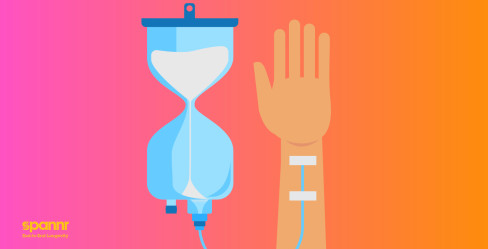IV Therapy for Aging - Longevity Elixir or Hype?

If you live in or near a major metropolitan area, you’ve probably seen the rise of intravenous (IV) therapy.
Packing a punch in a small bag of nutrients, IV drip therapy, or “IV drips,” can be found in IV clinics, IV bars, mobile IV therapy, IV lounges, and general health and wellness centered clinics.
IV fluids used to be something you’d only receive when you were sick in the hospital. Today it has become known as a way to boost your health in a short period of time, even if you’re healthy.
In fact, IV hydration therapy is purported to help with hangovers, your immune system, low energy, dehydration, food poisoning, and the ability get your body back to tiptop shape.
In a day and age of fast food, quick information, and instant gratification, the promise of a quick fix for our health sounds enticing. Does the reality match the hype?
Let’s explore if IV therapy is as beneficial to your health and longevity as the marketing claims.
What is IV therapy?
IV therapy is a method of delivering fluids, vitamins, or medications via a patient’s bloodstream to provide health benefits or address medical issues. IV technology first came around in the 1800s, but it wasn’t widely utilized until the 1950s.
Even then, IV therapy was used primarily in a clinical setting for patients with medical conditions. IV bags typically contain a saline solution, which is meant to rehydrate and feed the body, especially if a patient can’t get proper hydration or nutrients the normal way.
IV Hydration Therapy vs. IV Nutrient Therapy
IV nutrient therapy, on the other hand, is utilized by patients and consumers with or without health issues. IV bags with added vitamins and minerals are commonly referred to as “banana bags” or “Myer’s Cocktails.”
Banana bags are yellow (like a banana), due to the added vitamins. Myer’s Cocktails are named after a late physician from Baltimore, Dr. Myers, who used this specific type of IV therapy to treat a variety of medical conditions, such as migraine, fibromyalgia, depression, upper respiratory tract infections, and more.
Many times, people choose to use IV therapy to quickly improve their current state of health, from tackling jet lag to beating a cold, and more.
Although studies have been done on IV micronutrient therapy on treating medical conditions, such as fibromyalgia, the results are still fairly uncertain.
What are the benefits of IV therapy?
IV therapy helps with issues that tend to result from dehydration or vitamin deficiency. There are a few things that make IV therapy more beneficial than getting hydration or nutrients orally.
- Immediate absorption into bloodstream
- Immediate hydration
- Ability to consume a higher dose of vitamins and minerals at once
An additional reason you’d want to use IV therapy over other means is if your body’s ability to absorb nutrients is compromised, whether that’s because of a gastrointestinal issue or another type of illness that prevents your body from utilizing all the nutrients it receives.
How is IV therapy connected to longevity?
Getting the proper vitamins and minerals is crucial for us as human beings, as long-term vitamin deficiency can put a person at higher risk of mortality. If you remember, the news over vitamin D exploded during the pandemic, when it was revealed that low vitamin D levels are closely linked to an increased risk of all-cause mortality.
Because of that, one can argue that IV therapy can help increase longevity.
Can’t I just take vitamins and drink water?
Now, is IV therapy the only means of getting the vitamins and minerals your body needs to thrive? Not necessarily.
The idea of a quick fix when it comes to our nutrients and hydration levels is appealing, but our body has internal processes that manage our fluid and vitamin levels. And as we already know, the body will urinate excess vitamins once optimal levels have been reached.
Although IV hydration and vitamin therapy can both help in arenas where there are clear deficiencies, there isn’t enough evidence to support the idea that these therapies provide additional benefits to someone with normal hydration and vitamin levels.
If you’re wondering if you can take vitamins, eat clean, and drink water instead, the answer is generally: yes.
With that said, if you’re lagging in hydration or vitamin levels, what can IV therapy help with? Similar to vitamin pills, IV therapy can provide:
- Boost of your immune system
- Increase in energy levels
- Maximum hydration, especially noticeable when curing a hangover or jetlag
- Calm and relaxation
- Recovery from workouts
- Skin, hair, and nail glow
- Decrease in morning sickness symptoms
- Clearer head (if dealing with brain fog)
Where can I get IV therapy near me?
You can usually find IV therapy in many locations that provide integrative or alternative health services, wellness clinics, weight loss clinics, and gyms.
Here are a few franchises that offer IV therapy:
Before selecting a place to get IV therapy, consider the following criteria:
- Choose a provider with at least a few years of experience (e.g. registered nurse, licensed practical nurse, or nurse practitioner)
- Ensure the location you choose is clean
- Inquire about the source of vitamins, ensuring they are US-based
What are the costs of IV therapy?
As with many longevity services provided at consumer clinics, elective IV therapy isn’t normally covered by health insurance. If you can afford the prices, IV therapy is going to range on average anywhere from the low $100s to $400 per bag, depending on the mixture of hydration and vitamins.
If you decide to get IV therapy on a regular basis, some places offer membership options, which lower the price per bag.
Are there any risks associated with IV therapy?
Finding a location that meets the criteria above is important in off-setting some of the risks that may accompany IV therapy. Additionally, it’s important to consult with a healthcare provider to make sure IV therapy can address your needs and to make sure there are not any contraindications.
Some of the risks of IV therapy are:
- Nutrient overdose or vitamin toxicity
- Nutritional imbalance
- Air embolism
- Allergic reaction
- Blood clot
- Infection
- Injury to the skin and tissue
Who should consider getting IV therapy?
Getting the appropriate amount of vitamins and hydration, through food, water, and other means, is important in remaining healthy and keeping illnesses at bay.
If you have nutritional deficiencies, gastrointestinal disorders, malabsorption issues, or have another condition that may require you to get additional supplementation, you may be a good fit for IV therapy. However, if you have one of these ailments, you may be better served in a hospital, especially if your insurance covers IV therapy there.
If you do not have any hydration or nutritional deficiencies and are simply looking to boost your health, getting IV therapy may provide you with benefits, as long as you choose a safe location and discuss IV therapy with a healthcare provider. If you have the money to spend and have targeted health benefits you’re looking to achieve, IV therapy may be for you.
About the Author
Sign Up For Our Newsletter
Weekly insights into the future of longevity
